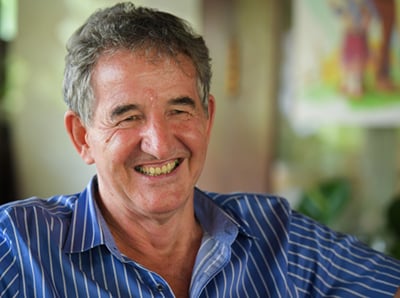 |
Raymond MallonSemi-retired economist and former wine consultant
“Policy makers appreciated hearing about Australian economic reform experiences. Australia was seen as having less of an ideological bent with a more pragmatic approach to achieving development outcomes. They valued Australian analysis that tried to identify the level and distribution of costs and benefits of reform.”
|
Ray first came to Viet Nam in 1988 as ADB’s country economist. This was the end result of “a fascination with Southeast Asia, and especially Vietnam” since his childhood growing up on a sheep farm”. While at university, he made good friends with other students from the region and got to learn more about the places, the people, and food. Soon after university he jumped at an offer for an Australian job that included work in Southeast Asia, and later moved to work in Manila as ADB’s country economist for Laos and Vietnam.
While at ADB, Ray was seconded as Resident Economist to UNDP in Ha Noi. Having fallen in love with Vietnam, and his future wife Trinh, he accepted a job as a World Bank economic consultant advising the State Planning Committee. Since 1995 he has been working as a freelance economic consultant working with Vietnamese and international partners.
His wife, Trinh and her partners opened a couple of restaurants (Wild Rice and Wild Lotus) and Ray added “wine consultant” to his resume. These restaurants, which hosted many Australian events, provided opportunities to introduce Australian wine and products to Vietnam.
Ray worked particularly closely with Vietnamese colleagues from the Central Institute for Economic Management (CIEM) and the Ministry of Planning and Investment. He also worked with officials from numerous other agencies including the Ministry of Trade and Industry and the Vietnam Chamber of Commerce and Industry (VCCI). He also worked with the economic committees of the Party and the National Assembly in projects funded by the Australian Government and other development agencies.
“Australia and Vietnam had shared perspectives on the potential of regional economic integration and business development that provided a strong basis for sustained policy engagement,” Ray said.
Commenting on the dramatic changes since first visiting Vietnam, Ray noted that major achievements were the rapid progress in reducing poverty, controlling hyperinflation and improving living standards. Since stablising the economy, encouraging competition, allowing private investment and opening to international economic markets and technology, the economy has blossomed. “The goal of economic development is to reduce poverty and improve living standards: Viet Nam's achievements with economic development have been truly impressive.”
Ray noted Australia’s role in the early stage of economic transition of Vietnam, when Australian academics and officials worked with Vietnamese colleagues on economic stabilisation issues, and Australian companies became among the first foreign investors from market economies. Some, like Telstra and n ANZ had tremendous impacts in telecommunication and banking sector modernization. And, early Australian support for English language training facilitated more substantive dialogue between Vietnamese and the international community on economic development issues.
“I’d like to think that we foreign economic advisors made some minor contribution to Vietnam’s reform process, but it is clear that the Vietnamese have led and driven the process.” he said, noting that Vietnam didn't always accept mainstream economic advice. Instead, Vietnam pragmatically adapted policies to meet national needs and to respond to practical results of policy experimentation. Ray discusses this reform experience in an Australian National University published book that he co-authored: “Viet Nam – a transition tiger?”.
“I think Vietnam was especially interested in learning from the experiences of other middle-size, mixed economies. Australia was of particular interest because it is a competitive regional market economy with relatively proactive government involvement in education, health, and social security.
Vietnam is now emerging as a leading player in global and regional value chains. Vietnam is also proactively engaged in dialogue on regional and global economic integration, playing a leading role in discussions within ASEAN, as well as in discussion between ASEAN and neighbours like Australia, China, South Korea, Japan and New Zealand.
“Vietnam has also been active in CPTPP negotiations, sometimes drawing on joint analysis with Australian advisors and researchers,” Ray said. He believes that there remain more opportunities for Vietnam and Australia to cooperate in areas like urban planning, renewable energy, the digital economy, education, and business services, where Australia has a comparative advantage.
What Ray values most about the relationship is trust and shared mutual respect. “Trust, it is very important. We are often involved in dialogue on challenging policy issues where both countries are learning from each other’s experience. There can be differing views or even disagreements on some policy issues, but debating such differences in an environment of shared mutual respect provides opportunities for both sides to learn from each other.”
Ray noted that he is happy that both his Vietnamese-Australian daughters are also economists that are very interested in economic development and environmental issues.
